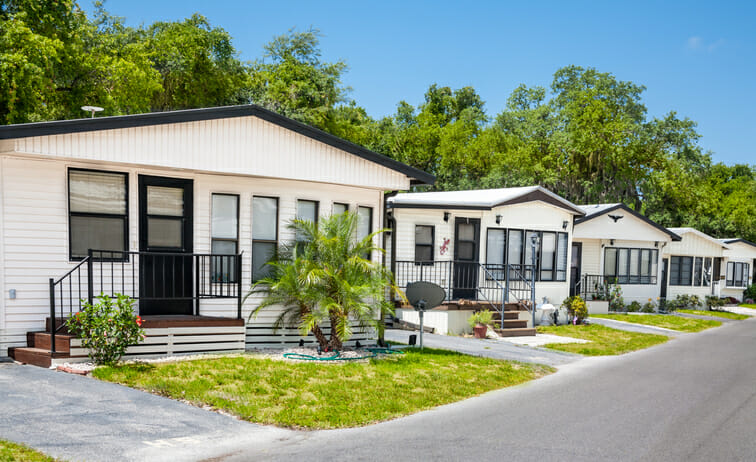Mobile and manufactured homes are affordable housing options, especially for people living a nomadic lifestyle or in remote areas. But, if you want to finance a mobile home, some lenders may not consider them eligible for a traditional loan. Fortunately, other mortgage options are available to help you finance your home purchase. So, to help you navigate the mobile home buying process, let’s break down what you need to know about mobile home mortgages.
A financial advisor could help you create a financial plan for your home buying needs and goals.
How to Qualify for a Mobile Home Mortgage
With the housing market still not showing signs of cooling off, buyers are reviewing their options for finding and financing a home. For decades, a mobile or manufactured home has remained a solid, affordable option.
A mobile or manufactured home offers many of the same comforts and advantages of a traditional house and comes at a lower cost. However, financing these kinds of houses is unlike that of a typical home, and understanding the process will help you decide if this is the path for you. Here are three things to keep in mind:
Verify your credit score. The first step in acquiring financing for a mobile or manufactured home is establishing an excellent credit score (ideally, over 720). Your credit score will determine whether or not lenders will want to work with you and the interest rates and terms they will offer you on prospective loans.
Lenders have a variety of standards for credit scores and credit history. Therefore, building good credit and requesting information from as many lenders as possible is key to obtaining a loan that works best for you.
There are three major credit reporting bureaus: Equifax, Experian and TransUnion. They each track your credit in slightly different ways and give you one free credit report per year. Use these reports to get an idea of your current credit and how you can improve your score.
Gather your down payment. A down payment might not be mandatory for the loan you end up receiving, but many lenders look for at least 3% of the loan as the down payment. Setting money aside for a down payment will reduce your monthly payment and help you qualify with lenders who need a down payment.
Compare lenders. Next, you’ll want to look at how lenders stack up with each other. The costs associated with getting a loan and the interest rate on the loan vary by lender. By doing your homework on the lenders available, you’ll save yourself money and make a more educated choice on financing your mobile or manufactured home.
Mobile Home vs. Manufactured Home
Over the years, “mobile home” and “manufactured home” have, for many people, come to mean the same thing. However, the two are different. Any prefabricated home built before June 15, 1976, is a mobile home.
While the prefabricated houses built after June 15, 1976, resemble those from before, the U.S. Department of Housing and Urban Development (HUD) applied increased safety standards to these homes, thus changing their name from “mobile” to “manufactured.”
Additionally, while mobile homes are portable after construction, manufactured homes (sometimes called modular homes) are permanent structures that don’t get moved once built.
5 Types of Mobile Home Mortgages

In the eyes of lenders, mobile homes are not considered real property. Therefore, traditional mortgages aren’t usually an option. However, you have an array of options to meet your financing needs. Each brings its own positives and negatives, and understanding them all will help you decide how you’ll pay for your home. Here are five types of mobile home mortgages:
Conventional loans. Conventional loans usually don’t apply to mobile homes, but there are exceptions. Fannie Mae and Freddie Mac offer mortgages for these homes under certain conditions.
With Fannie Mae’s MH Advantage program, buyers can get a 30-year loan with a 3% down payment. However, a small percentage of mobile or manufactured homes will meet all the particular qualifications needed for this loan. For example, the home must be on land you own and be a minimum of 12 feet wide.
Similarly, Freddie Mac has loans available with standards not common to all manufactured homes. While this may cause difficulty in accessing financing, these are the two lenders that offer conventional loans for mobile and manufactured homes, so it’s worth looking into.
VA loans. If you’re a veteran or a qualifying active duty member, a VA loan could be right for you. To qualify, you must be in a situation in which you are looking to buy a manufactured home and the land it occupies. With no down payment or mortgage insurance required, taking advantage of this opportunity can offer you significant savings.
FHA loans. The government gives loans for manufactured homes through the Federal Housing Administration (FHA). FHA loans come in two types: Title I and Title II.
Are you looking to purchase a manufactured home, but not the land underneath it? A Title I loan could be the option for you if the home will be your primary residence and meets a few other prerequisites (have utility connections, for example). The loan term will be a maximum of 20 years, and the amount you’re able to borrow might be less than what Fanny Mae or Freddie Mac lend.
You can use a Title II loan for a manufactured home and the land on which it rests. These loans must be used for homes built after 1976, so actual “mobile homes” do not qualify. Properties in mobile home parks are also not valid for this kind of loan.
Chattel loans. A chattel loan is not limited to mobile or manufactured homes. As the name implies, these loans can finance multiple kinds of vehicles or machinery, such as a truck or a boat. In addition, these loans are designed to come in lesser amounts and be paid off more quickly than conventional loans.
All loans involve some risk, and the chattel loan is a prime example. The home you’re looking to purchase would be put up as collateral, so if the loan went into default in the future, the lender could repossess your home. However, stable borrowers can feel confident about a chattel loan, as they remain a popular choice for mobile and manufactured homes.
Personal loans. Lastly, a personal loan could be your solution if you’re having trouble acquiring financing from the previously mentioned sources. With a personal loan, financing is given without property stipulations and in amounts as high as $100,000 or more.
Additionally, unlike chattel loans, no collateral is needed. Another benefit is the time required to secure a personal loan is typically shorter than the other loans listed above.
Beware, though, that prospective buyers with poor or mediocre credit might find this a less realistic option, as interest rates over 20% could be applied to the loan for credit-challenged borrowers.
How to Pick a Mobile Home

As with other sorts of homes, multiple factors are at play when considering what to prioritize in your prospective home and what to buy. A mobile or manufactured home’s size, condition and location are all key elements to think about. Here’s what you need to consider:
Size. The size of your home will impact where it will fit and how much it will cost. When looking at different manufactured homes, you’ll notice that they are typically categorized by width. Single-wide or double-wide will be your options, with the former being just under 15 feet wide and the latter being twice that.
Your home will most likely be about 70 feet long. Keep in mind that many municipalities only allow double-wide mobile or manufactured homes, so verify the laws with the town you intend to live in before making your purchase.
New or used. Mobile or manufactured homes will depreciate over time. That means, unlike a typical house, that a new manufactured home costs significantly more than a used one. However, a used manufactured home can come with problems such as leaks, pulling away from the foundation or frame and damaged insulation.
The year your home was built could also affect where you can put your home. Therefore, if you’re buying a used mobile home, do your research and make sure you schedule an inspection.
Location. Where you place your home is an integral piece of the puzzle. One straightforward solution is to use land that you own. Purchasing or leasing land to install your mobile home can be costly but necessary.
In any case, make sure your intended location’s zoning laws permit you to install our home there. You’ll need to ensure that the land can accommodate your home and that you can connect to utilities. If you’re renting a plot, make sure your home does not violate any restrictions in the mobile home community you’re looking in.
Bottom Line
From financing options to the exact age of the home, numerous details are essential to consider when buying a mobile. As a borrower, having good credit will ease the process of securing financing. Once you know how you’ll get a loan, working out what you’d like in a home and where you’ll place it will help you decide what to buy. If you do your homework, a mobile home can be a comfortable, affordable alternative to a conventional home.
Tips for Buying a Home
- A financial advisor could help you create a financial plan for your home buying needs and goals. SmartAsset’s free tool matches you with up to three vetted financial advisors who serve your area, and you can interview your advisor matches at no cost to decide which one is right for you. If you’re ready to find an advisor who can help you achieve your financial goals, get started now.
- Regardless of how much help you get from federal programs, you should start your mortgage hunt after you know how much house you can afford.
Photo credit: ©iStock.com/Marje, ©iStock.com/Pekic, ©iStock.com/Tempura
